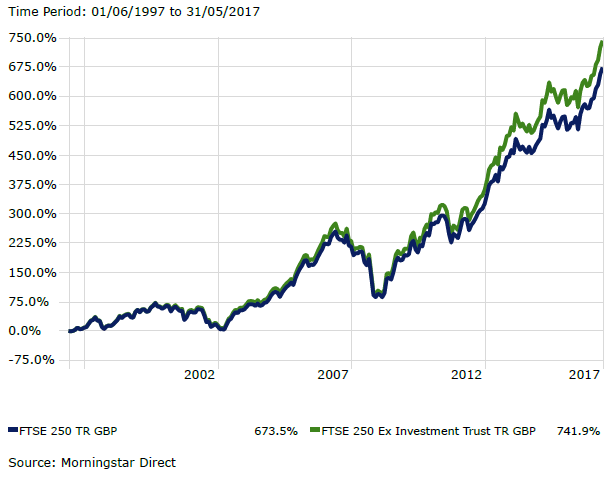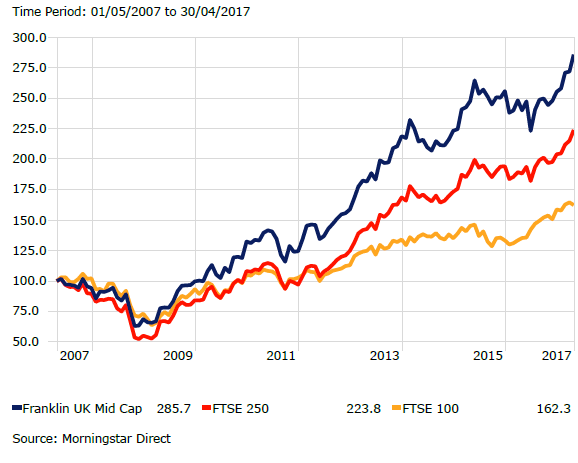Invest in the FTSE 250 and you may get a surprise
16th June 2017 11:07
by Neal Underwood from interactive investor
Share on
Passive funds can be a great way to access the performance of an index cheaply. But investors who seek passive exposure to the via an index tracker or an exchange traded fund (ETF) may not be getting exactly what they bargained for.
The index of the 250 next largest companies outside the also includes a weighting of around 15% in investment trusts listed on the London Stock Exchange, many of which have different strategies and geographic exposures with little or no connection to the UK stockmarket.
This high exposure to investment trusts has been a significant drag on the FTSE 250's performance, as you can see from the chart below. There are currently no passive vehicles which offer investors exposure to the FTSE 250 ex-investment trusts.
FTSE 250 vs FTSE 250 ex investment trust performance over 20 years

Mid-caps tend to be under-researched, underinvested and generally lack so-called informational efficiency that their larger-cap counterparts enjoy. Over time, research shows mid-cap companies have outperformed larger ones, albeit often with bigger ups and downs along the way.
There are periods when they can underperform, as they did in the wake of the UK's EU referendum result last June, although they have since recovered strongly.
Because of their size, mid-caps do have the potential to grow quicker - it's far easier for a small company to double its size than a behemoth. Mid-caps also provide useful diversification for UK investors.
And 250 stocks can offer great opportunities for skilled active fund managers, who have historically shown they are able to exploit inefficiencies in order to produce superior returns relative to the market. An alternative to passives is to invest in one of these funds.
Managers of active mid-cap funds such as , , and typically exclude investment trusts from their investment universe, so their funds are a more accurate reflection of the UK mid-cap space.
Paul Spencer, manager of Franklin UK Mid Cap, believes UK mid-cap companies occupy a "sweet spot" for growth; big enough to be established but small enough that they still have room to grow.
His focus is on companies whose valuation is cheap enough to give him an entry point and which have the potential to grow over the long term.
The chart below shows the fund has outperformed the FTSE 250 over 10 years, which in turn has significantly outperformed the FTSE 100.

Richard Watts, who runs Old Mutual UK Mid Cap, invests in a broad range of themes and investment opportunities across the UK economy from retailers to manufacturing exporters, from high-tech growth companies to established mainstream brands.
He says UK mid-cap companies are more internationally exposed than is generally perceived, deriving earnings from both domestic and global markets.
"Mid-cap companies are often less well known than their larger counterparts - and therefore more likely to be relatively under-researched and undervalued. In the long term, mid-cap companies can often outperform large cap companies."
This article is for information and discussion purposes only and does not form a recommendation to invest or otherwise. The value of an investment may fall. The investments referred to in this article may not be suitable for all investors, and if in doubt, an investor should seek advice from a qualified investment adviser.